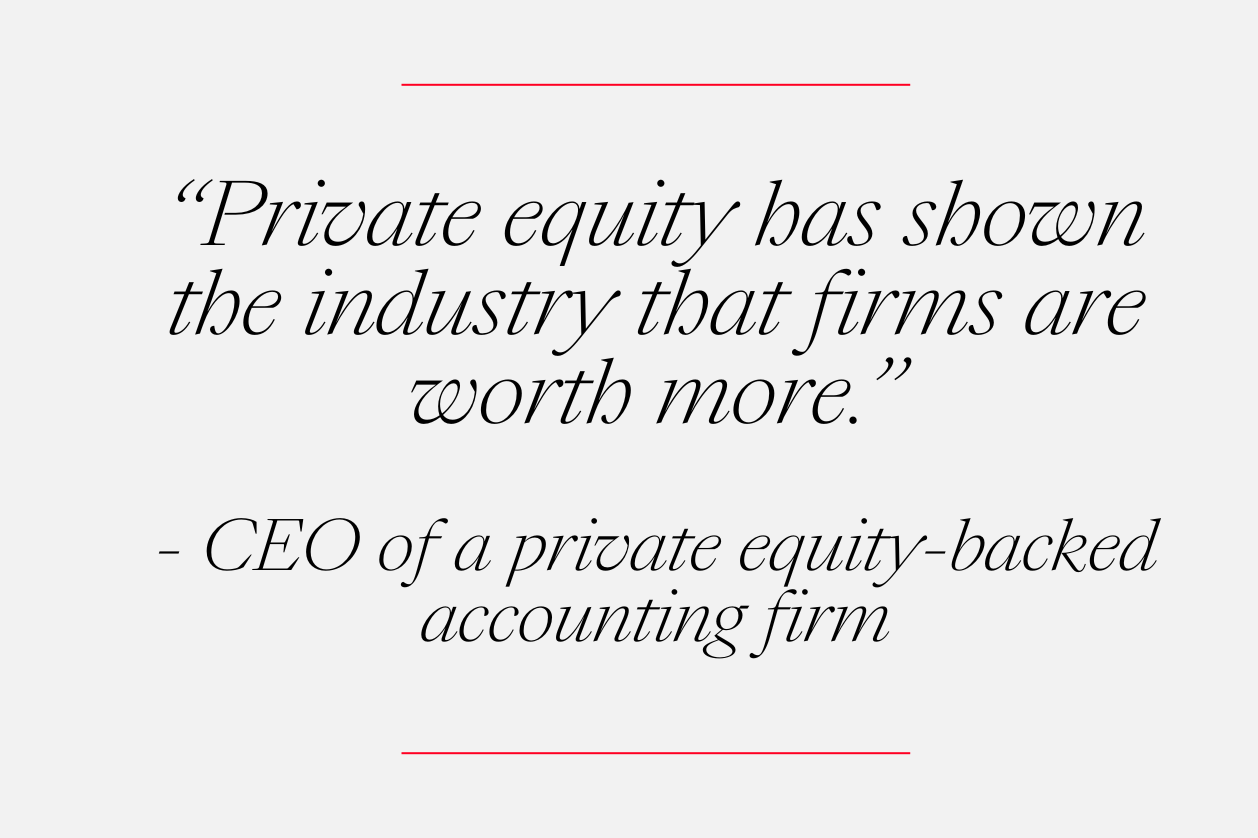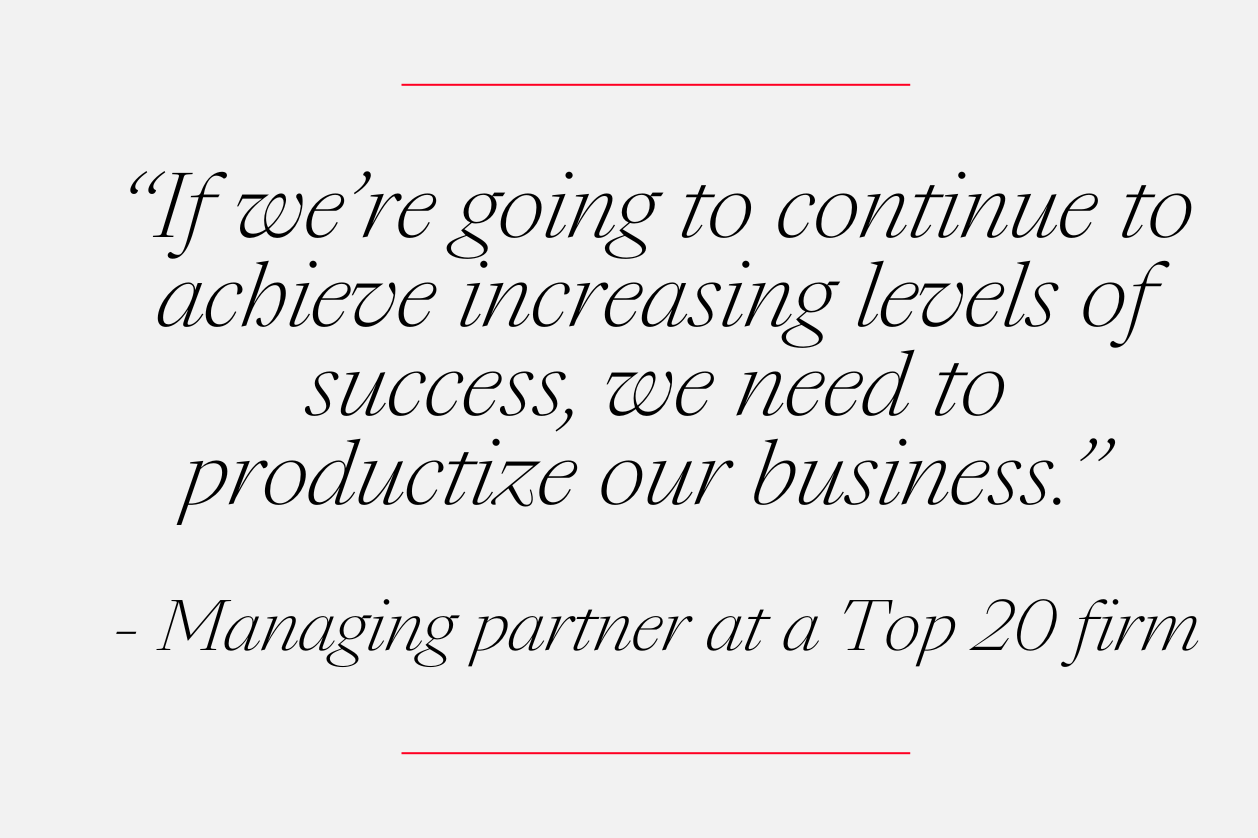2023 Accounting Firm Industry Insider Series: Key Takeaways from In-Depth Conversations with Managing Partners (Part 1)

The accounting industry is in a state of transition. The influx of private equity, labor shortages, and remote/hybrid work have all impacted accounting firms to varying degrees.
To better understand the landscape of the accounting industry – current and the anticipated future – I have been interviewing managing partners and industry insiders regularly for the past three years.
I recently spoke in depth with managing partners and CEOs at a range of accounting firms – from small- and mid-sized firms to Top 10 firms – for insights on the industry’s leading issues. While interviewees may have different viewpoints on certain topics, the general mood reflected the industry’s strong performance along with an awareness that changes are afoot.
In this first article of a two-part series, I’ll share information pertaining to the impact of private equity and the industry’s evolving business models. In part two of the series, I’ll share key takeaways from these comprehensive conversations regarding talent and outsourcing, their financial impact on firms, and what is on the horizon for the industry.
Private equity is the “64-million-dollar question” in the industry.
Private equity has shaken up the accounting industry and raised several questions. The impact of private equity on the industry goes beyond the number of firms that are acquisition targets. According to a Top 20 firm, the most significant impact of the private equity model is how it has reshaped M&A activity. “The introduction of cash by private equity got a lot of people thinking about selling,” he said.
With the traditional merger model, fewer partners considered selling because they would trade an equity stake in one firm for an equity stake in another. But as private equity firms began offering cash to sellers, more partners have been considering whether it makes sense to sell. A managing partner at a mid-sized firm remarked that private equity is “disrupting the marketplace,” though the firm hasn’t seen an impact on competition for clients or employees.
Some industry leaders voiced concerns about private equity in the accounting space. The managing partner at a large firm said he has concerns about whether private equity firms can fully integrate target firms given the speed with which they are acquiring. Additionally, he questions whether private equity sponsors will provide long-term value for partners.
Conversely, a large private equity-owned firm credited the availability of cash with enabling it to build and enhance the firm’s infrastructure, pursue M&A activities (including acquisitions of non-CPA firms that provide complementary services), hire HR and IT expertise, and recruit strong board members. He also believes that the traditional accounting firm partnership model, which requires decision-making participation from partners, is less efficient than the private equity business model, which takes a more top-down approach to business decisions. The CEO of another private equity backed accounting firm shared similar thoughts, saying that private equity offers resources that may be unavailable in the traditional partnership model without cutting into partner compensation.

“Private equity has shown the industry that firms are worth more,” noted the CEO of a private equity-backed accounting firm. And the CEO of one of the nation’s largest firms noted that private equity’s cash-at-closing model has created an expectation throughout the industry that sellers will be paid some cash at closing. “It’s hard to acquire firms without paying cash,” said one interviewee. “Traditional firms [in the acquisition business] will need to figure out how to deal with this.”
When asked about the private equity exit strategy, a leader at a private equity-backed firm said likely options are selling to another private equity firm or, in rare cases, becoming a public company. He also believes private equity “gives a 45-year-old partner multiple bites of the apple,” because there will be multiple liquidity events over the course of their career.
Accounting firms’ business models are evolving – but in different ways.
For the managing partner at a Top 20 firm, the evolving business model extends beyond outsourcing and advisory services. “If we’re going to continue to achieve increasing levels of success, we need to productize our business,” he said.
The managing partner at a smaller firm echoed these sentiments, saying that the days of doing tax returns are dead and suggested that accounting firms will need to evolve to provide other services like bill payment services, executive assistants, family office, and wealth management services.
The CEO of one of the nation’s largest firms criticized the industry’s “gatekeeper mindset,” whereby a partner controls client relationships. Instead, he recommended that firms think of clients as the firm’s clients, not an individual partner’s client, to foster cross-selling. He also advocated for increased salaries for starting accountants and predicted an increased need for specialized business development roles because those entering the industry don’t want to “burn oil at both ends.”
A couple of interviewees mentioned that the regulatory environment has gotten more challenging, predicting that firms will be reluctant to do public company audits, and a leader at a Top 20 firm wondered how the restrictive covenant limitations enacted in some states and proposed at the federal level may impact the business model.

In part two of the series, I’ll share key takeaways from these comprehensive conversations regarding talent, outsourcing, their financial impact on firms, and what is on the horizon for the industry.
Special thanks to the managing partners, CEOs, and COOs who shared their opinions, experience, and insights with me.